John Janaro's Blog, page 92
August 18, 2021
Social Media: "Offering" it to Christ
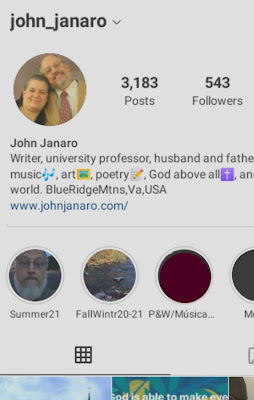 What is the use of all these communications technologies that we call "social media"? Do they have a positive value for our lives as human beings, and more particularly for our vocation as Christians?
What is the use of all these communications technologies that we call "social media"? Do they have a positive value for our lives as human beings, and more particularly for our vocation as Christians?Certainly they provide many ways to bear witness the Gospel, and to perform "works of mercy." I want to focus in particular on the opportunities they provide for us to give of ourselves - through attentiveness, instruction, sympathy, and awareness of one another's needs - and in these ways to encourage and build up one another and pray for one another. Here we can share words, images, music, prayer, and solidarity in the Lord. It is all “offering,” to Christ, to be His instruments to build God’s Kingdom, and the Lord brings our offerings to fruition according to His measure, in His time. Much we do not see, and what we do glimpse - what touches our experience - is only the beginning.
To encounter brothers and sisters all over the world, to pray for them (and with them - even in powerful and moving ways, such as many experienced during the live streams last year), to learn from them, to receive their gifts of expression, wisdom, and witness, and to offer my own encouragement and words (the two “small coins” of my poverty, which is not much but it's what I have; it's what I can give) - all of this is blessing, a cause for gratitude, a sign of the mystery of the Father’s love and the Lordship of Jesus who has won the victory and draws all things to Himself.
Communications technology belongs to Christ, and through it He brings us to possibilities to experience our “being-together” person-to-person, and to live in greater solidarity in this moment. A heart emoji❤️ is only a shadow of the inexhaustible “Yes” that Jesus says to our whole humanity, to each person, through the gift of His pierced heart on the Cross. Through His Heart, we can express gratitude and fraternal charity even with these apparently superficial means of communication. Jesus gives them value on a whole new level, which we experience insofar as we remember our belonging to Him and to each other in Him.
We don't need to worry overmuch about how "effective" our interaction is here, or on how many people we "reach" in our efforts to communicate. The Spirit is at work, and His measure is infinite - beyond all the small limited unstable statistics, “likes,” followers, responses, or anything we can measure. Of course we make our best practical attempts to reach out in appropriate ways that media make possible. But our efforts for "success" have only a relative importance, and will be fruitful only if we “offer them” to the Lord and receive our own value from His love.
August 16, 2021
Jesus Embraces Us in Our Suffering
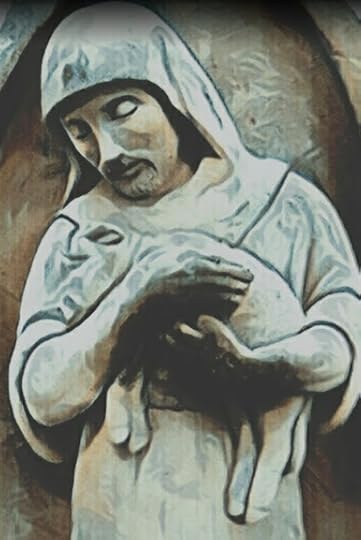 We live in a world of immense suffering.
We live in a world of immense suffering.We all know how hard it is to deal with acute, immediately perceptible instances of suffering—instances of physical, mental, and/or emotional pain. It's hard enough to hear the stories of other people. And usually we want at least to be distracted, as much as possible, from our own pains. What we feel intensely is the need for relief, and we are grateful for anyone and anything that can give us some real help.
But the whole reality of suffering is deeper than the external struggles that engage so many of us. People don't suffer "equally" (certainly not on every level or at any given time). But everyone suffers in this world, and everyone's suffering is uniquely their own.
At some point, everyone has distinct and profound experiences that can be at least partially articulated, that indicate the brokenness and incompleteness of their life: something that has disappointed or hurt them; someone who has betrayed them or manipulated them; something that does not measure up to a once-cherished hope; some kind of health issues; some catastrophic events or tragic losses; some family or friends who have let them down, abandoned them, misunderstood them; some limitation that inhibits their freedom; some burden that tires them; some hunger that is never satisfied....
People usually accommodate themselves to reduced expectations about life, especially as they get older. How else could one get through the day? Sometimes, however, one can still catch an echo of a cry of pain, that deep and mysterious pain at the heart of every human life. Life is, in some measure, always something that has to be endured.
Why is this? Most broadly, it's because we live in a radically broken universe. We suffer because of sin: original sin, our own personal sins, and the sins of the world. But why has God permitted so much sin and so much suffering?
God doesn't give a theoretical, intellectually satisfying answer to the depths of this agonizing question. He does something much greater. He comes to dwell with us in this broken world, and bears all our sufferings and sins out of love, thereby transforming the meaning of suffering.
Because of this, we do not suffer alone. We suffer in Jesus Christ, who is God’s love made personal and particular for each one of us.
Jesus is God drawn close to our wounded humanity, so close that He takes it upon Himself—not only in some “general” way, but in a way that encompasses each one of us. Jesus is the intimate companion of each and every human person, even those who do not know Him. He knows each one of us; He unites Himself (He—God the Eternal Son of the Father) to my humanity and to your humanity; He dwells with us and suffers with us in order to raise us up to a share in His life with the Father in the Holy Spirit.
He knows “who I am” and who He wills me to be. He knows the secret of why I was created. He knows my sins. He knows how to heal me of them, how to draw me to Himself, how to make me the “adopted son” that I am meant to be in Him for all eternity.
And so my joys and sufferings too (which He permits) are taken up into His infinitely wise, uniquely crafted, and tender love through which He shapes my life and leads me to my destiny.
How little I really understand about my “destiny.” How little I understand about the “eternal life” which means belonging to Him forever. We must remember every day that God is with us and that He draws us toward our true identity, which is to reflect His eternal glory in that unique way that corresponds to each of us as a person created in His image and likeness—a reflection that we do not yet understand but that He sees and knows.
We ought to dwell upon this and call it frequently to mind. Those little prayers throughout the day are worth so much: "Jesus, I love you." "Jesus, I trust in you." "Come, Holy Spirit." God, help me!" No matter the storms and the fury; the depths of our lives are not solitude. We are never alone.
At the heart of life, of every moment of life, the merciful God who is infinite, unconquerable love accompanies us, gives Himself to us, and asks us to open our hearts to receive Him.
August 15, 2021
August 15: The Assumption of the Blessed Virgin Mary
From the Second Reading for today’s Solemnity:
“Brothers and sisters: When that which is mortal clothes itself with immortality, then the word that is written shall come about: Death is swallowed up in victory. Where, O death, is your victory? Where, O death, is your sting? The sting of death is sin, and the power of sin is the law. But thanks be to God who gives us the victory through our Lord Jesus Christ” (1 Corinthians 15:54-57).

August 14, 2021
Maximilian Kolbe: Witness to Freedom
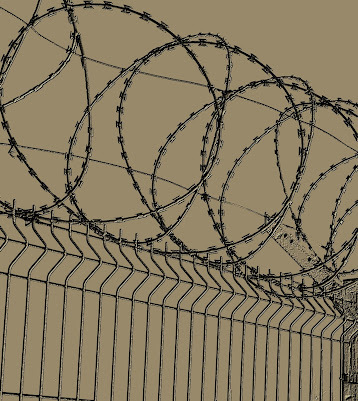 Today often takes me back to that crucial, dramatic Summer of 1989 (a time when so much was changing in the world and in my own life). There was a feeling in the air in those days (perhaps I felt it a little myself) that truth might actually have an impact on history, or that - in any case - it was worth suffering for, even dying for. It was a time when many people’s hearts were being stirred up (even if only in obscure and fragmented ways) by the truth, and they were moved to take risks for the truth, or to vindicate those who had long suffered for it: in Prague, in Beijing’s Tiananmen Square, in Poland, in Hungary, in the Baltics, along the prison gates that were the borders of “East Germany.” People were becoming aware of “freedom” as a truth that belongs intrinsically to the dignity of the human person. Nevertheless, it was a fragile intuition: people wanted freedom, but they didn’t know why; they didn’t know what human freedom is for. Sadly, the so-called “free world” was little help in educating them. Self-centered, humanly disconnected, dissipated restlessness is not true freedom. Nor is true freedom found by wandering aimlessly over the globe amidst an ever expanding market of vacuous possibilities for diversion and distraction. Though much good was achieved after the fall of Soviet Communism, the social chaos of liberal Western "free societies" also poured into the new nations, and the ensuing years have brought a lot of pain, confusion, and strange backlash among these peoples who were thirsting for true freedom in 1989.
Today often takes me back to that crucial, dramatic Summer of 1989 (a time when so much was changing in the world and in my own life). There was a feeling in the air in those days (perhaps I felt it a little myself) that truth might actually have an impact on history, or that - in any case - it was worth suffering for, even dying for. It was a time when many people’s hearts were being stirred up (even if only in obscure and fragmented ways) by the truth, and they were moved to take risks for the truth, or to vindicate those who had long suffered for it: in Prague, in Beijing’s Tiananmen Square, in Poland, in Hungary, in the Baltics, along the prison gates that were the borders of “East Germany.” People were becoming aware of “freedom” as a truth that belongs intrinsically to the dignity of the human person. Nevertheless, it was a fragile intuition: people wanted freedom, but they didn’t know why; they didn’t know what human freedom is for. Sadly, the so-called “free world” was little help in educating them. Self-centered, humanly disconnected, dissipated restlessness is not true freedom. Nor is true freedom found by wandering aimlessly over the globe amidst an ever expanding market of vacuous possibilities for diversion and distraction. Though much good was achieved after the fall of Soviet Communism, the social chaos of liberal Western "free societies" also poured into the new nations, and the ensuing years have brought a lot of pain, confusion, and strange backlash among these peoples who were thirsting for true freedom in 1989.The freedom of the human person is the capacity to love reality and other persons; it is the capacity to give one’s self in love, to choose that which is true and good and “make it one’s own” in a way that not only enriches the person’s own humanity, but also empowers the person to “become a gift” to others and to open up in longing for the Mystery that speaks to every heart.
This is human freedom. We have only begun to struggle to discover what this means for ourselves and for our societies. We need to carry on this difficult work, even if world events tend to indicate that no one is interested in it today.
The only way to find freedom, to live in self-giving love, and to begin to build something that resembles a personalistic and communitarian society is by the light of freedom revealed in its fullest sense, in the One who said “the truth will make you free” and who also said “I am the Truth.” Letting ourselves be loved by Him, we will become free, we will learn to love beyond all our limits. This we will attain our true destiny in the fullness of freedom, and also we will live in this world with greater freedom and greater solidarity and attentiveness to one another and to the dignity of every person.
Today, August 14, we commemorate the life and the ultimate self-giving love of a free man, who was a bright light in one of the last century’s darkest places. And it was 32 years ago today, in 1989, that I wrote this poem in honor of Saint Maximilian Kolbe. Kolbe, a Polish Catholic priest, offered his own life in exchange for another prisoner in a reprisal execution in Auschwitz, and died in the "starvation bunker" on August 14, 1941.
Here I share once again (for whatever they’re worth) the words of poetry that his witness inspired in those hot and hopeful days of the Summer of 1989.
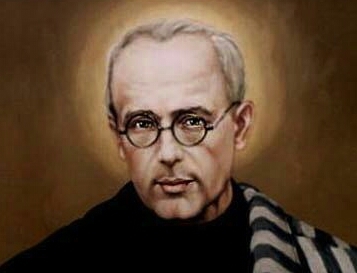
August 14th
I am the guardian
unworthy
of the flesh and blood that I command.
I stand
extended
from world's edge to windowless walls,
the quarry-block place markers
around my becoming-all-things.
I am a mother's graceful, sweet breath
dissolving
like fine, penetrating mist
against your broken, burned skin.
I am the witness
stepping out of place
away
beyond the trembling assembly
of bony finger-clutched this-moment,
toward the timeless returning unto dust of you
and you
and you.
Forward!
step forward...
...out of place
for I am
your sacrifice.
—August 14, 1989
August 11, 2021
The Poverty and Riches of Saint Clare
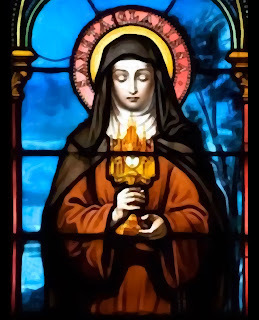 Today we commemorate the great Saint Clare of Assisi, who left aside her wealth at age 18 to follow the path blazed by the extraordinary witness of her friend and compatriot, Saint Francis.
Today we commemorate the great Saint Clare of Assisi, who left aside her wealth at age 18 to follow the path blazed by the extraordinary witness of her friend and compatriot, Saint Francis. She founded a contemplative community of religious sisters, often referred to as the "Poor Clares," and 800 years later young women continue to leave everything, join together in a life of poverty, and pray to God in the midst of our troubled and searching world.
“You know the gracious act of our Lord Jesus Christ, that for your sake he became poor although he was rich, so that by his poverty you might become rich” (2 Corinthians 8:9).
August 10, 2021
Saint Lawrence: Faithful in Service, Glorious in Martyrdom
August 9, 2021
The Conversion of Edith Stein

*********************************************************
For the August 9 Memorial honoring the martyrdom (in Auschwitz on this day in 1942) of that great Catholic member of the Jewish people and Carmelite nun Saint Teresa Benedicta of the Cross (known in the world as Edith Stein), I thought it would be good to present the brief story of her journey to Christ and the Catholic Church.I wrote this article over six years ago and it was published in my monthly column in Magnificat in November 2015:
Edith Stein traveled a path of conversion that included many encounters before she discovered Saint Teresa of Avila on a friend’s bookshelf. She was born in 1891 in Breslau, in what was then eastern Germany (now Wroclaw, Poland), into a vibrant Jewish family.
As a child, Edith was close to her mother, whose faithful Jewish piety was her first experience of religion. Edith also grew to be a brilliant student, and intellectual aspirations led her away from the simple devotions of her mother, so that at the age of 13 she “stopped praying” inwardly. But she continued to respect her mother’s convictions and accompany her to the synagogue. Her mother singing the Psalms no doubt laid the foundations within Edith’s soul of the search for ultimate truth. Thus, even as she lost belief in God, she also dedicated herself to finding truth.
She studied prodigiously and with great success in school and university, but also became frustrated with the pervasive atmosphere of scientific materialism. Then, in 1911, she first met Edmund Husserl. Husserl’s philosophical method made a powerful case for the transcendence of the human person beyond the material observations of empirical science. Husserl’s “phenomenology” convinced Edith, and others, that it was possible toknow the truth of “things in themselves.”
Edith decided to write her dissertation under Husserl’s direction. Meanwhile, something remarkable was happening: phenomenology was opening Husserl’s followers to God and religion. Many became Christians. At this time Edith Stein met Max Scheler, a Catholic convert who convinced her that religion was necessary for the fulfillment of the human person. It was because of Scheler, Edith later said, that “the world of faith unfolded before me” for the first time.
As Edith’s search for truth was moving forward intellectually, another friendship was crucial to her personal growth. Professor Adolf Reinach and his wife Anna opened their hearts and their home to Edith while she completed her dissertation and then became Husserl’s personal assistant. When Adolf Reinach was drafted into the war in 1917, he and Anna were baptized Lutheran Christians. Soon after, Adolf was killed in battle. The tragic death of the brilliant young philosopher, however, brought Edith to see something new in her friendship with Anna. Edith knew the terrible grief brought by death, but what she saw in Anna was a strength and peace sustained by her relationship with Jesus. Anna was still Protestant (she would later also become Catholic) but she was a decisive witness at this time on Edith’s path to the Church. Anna embraced her suffering through the power of the Cross, and, Edith later wrote, “that was the moment my unbelief collapsed and Christ shone forth.”
After this, Edith read the New Testament and came to believe in Jesus. This hidden faith in the power of the cross was thus prepared to take its definitive form on the famous night in 1921 when she read Saint Teresa’s Autobiography and discovered the fullness of the Catholic faith and the beginning of her own Carmelite vocation.
Here we have recounted only a few details from the beginning of the story of this great woman who we now honor as Saint Teresa Benedicta of the Cross, whose life, thought, and martyrdom have so profoundly enriched the Church. We all need to get to know her more.
My mother found in Edith Stein a great "spiritual friend" and heavenly intercessor, and now I pray that they have met in an unimaginably deeper way, and are rejoicing together in the presence of God.
The monastery was for Edith Stein the perfection of her faith through the grace of contemplative love. United with the heart of Jesus on the Cross, her hidden life was opened up by the freedom of God's love so that it might reach out in mysterious ways to accompany the suffering of countless people during the darkest days of Hitler's genocide (which claimed her own life) and beyond.
She saw clearly that "real life" meant living an inward participation in Christ's redeeming love for the world. Here above all was the continual "sharing in His death" that made her whole life an offering, and thus prepared her for the ultimate suffering of the concentration camp and the gas chamber. At the beginning of the year before she was taken to Auschwitz, surrounded already by the violence of the Nazi's stranglehold of Europe, Teresa Benedicta offered this reflection (January 6, 1941):

August 4, 2021
Remembering Mom, Part 1
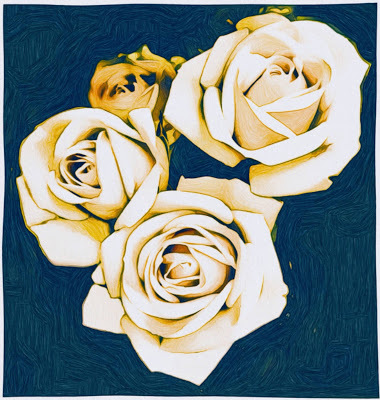 It has been a month since my mother died.
It has been a month since my mother died.I thought that by now I would be able to write a grand tribute to the remarkable woman who gave birth to me and played such a central role in educating me as a human being, not only in childhood but throughout my 58 years of life. Intellectually brilliant, physically frail, spiritually magnanimous, a lover of truth, a born teacher and powerful communicator, a tenacious fighter against her own implacable illnesses and limitations, my mother had a greatness of human stature.
She was a great woman, for sure. If this was all I could say about her, however, then it would be difficult to see her life as anything other than an inspiring memory at best, with an ongoing influential legacy of good deeds, and a personality so defined that it "points toward" a continuing "immortality" of her spirit in some unreachable realm. (At worst, her life could seem like a tragedy of great desire and ultimate unfulfillment, now reduced to a body buried in a grave in Winchester, Virginia.)
Human nature - in its current, fractured condition - "hopes" for the best (and sometimes fears the worst) within the limits of its ordinary perceptions about death.
But this is my mother! I still love her. I still love my father.
The death of parents (in particular) is a provoking experience at any age. It practically wrenches from your guts the aching question that is always within you but here becomes visceral and impossible to ignore or set aside: "Why are we alive on this earth? What is the ultimate meaning of all the things we say and do? What happens to it all at death?"
In our most noble and profound moments, we spontaneously experience the connection between "love" and "forever." We have the ineradicable desire to "write forever" in big letters all over the people we love, all over their actions for the good, and all over our own selves, the goodness in our relationships, and our actions which are vivified by this search for meaning and the "hint" of forever that surprises us when we engage reality and experience gratuitous goodness and beauty and truth.
Where did we "learn" this inner attitude that says to finite things: "Please, don't end"? Where did we get the idea that we could love another person forever? Are we a cosmic joke; are we freaks of Evolution? Or does life aim toward a Mystery, where our questions are heard and our hopes take the shape of promises?
The most important thing about my mother was not her talents or her human greatness. The most important thing was an event that happened to her and began to transform her life. At the beginning, it was an event that happened to her in baptism, through Water and the Holy Spirit. That newly given supernatural life in Christ grew in her, and found direction in other encounters through childhood and growing up. At her university there was a Catholic priest at the Newman Center, and she went to him with her many questions and ideas and speculations. He encouraged her to use her reason, but he also gave her some books to read - not only for the wisdom they contained but also, I think, because their writings were a means to encounter them and recognize as reference points these great men of the Church in her time: Romano Guardini. Jacques Maritain. Henri de Lubac. And others. Our bookshelf at home was full of these names.
And of course, the uniquely significant encounter of my mother's life was my father. They were a consistent "help" to each other on their long path of growing in faith and in relationship to Jesus Christ in the Church. Along with a small group of friends, their faith deepened during the 1960s (even as the faith of so many others was shaken). In 1968 Pope Paul VI spoke the truth about "human ecology" and warned that the most celebrated technological invention of the decade was a recipe for disaster, for the destruction of human relationships, for new modes of fragmentation and rootlessness, and for new ways for the strong to impose their power on the poor and marginalized. By that time, my mother and my father were prepared to receive this message, this teaching that would attach them more intimately to Jesus in their marriage and in the home they built for me and my brother.
My parents encountered Jesus in a very powerful way through the great witness of Popes (and saints) John XXIII and Paul VI.
I remember vividly, when I was four years old, being in the laundry room of our apartment building with my mother while she spoke to me with great seriousness and passion about the Church and the problems in the world, about Pope John and Pope Paul and their sufferings, and about a French 'Peasant' who was a philosopher who had helped her understand many things. I imagined a farmer with a great mind, or something like that. (Meanwhile, I passed the bookshelf every day for years after that and saw old Maritain's face staring out at me from the spine of the English translation of The Peasant of the Garonne. In graduate school, I finally read the book ... and many others by this great philosopher and towering 20th century Christian witness.) But my mother conveyed to me in that laundry room the immense grandeur and mystery of life, and the crucial significance of seeking the truth and being faithful to it.
And, of course, my mother taught me to pray.
----------------------------------------------------------
I will continue these reflections and reminiscences about my parents. It is good to recall that the ground they placed under my feet is still strong, and getting stronger, even though sometimes it feels like the roots have been cut out from under me. But grief is an experience that changes us on the road to our own destiny.
I miss them. Lord, I pray that you will embrace them forever in your Kingdom.
August 2, 2021
"Coffee Awesomeness" (Cartoon Version)
I had fun fooling around with this graphic, based on a recent photo. "COFFEE AWESOMENESS" was crafted with a cartoon filter, some artistic filters, and lots of manual alterations. #DigitalArt #DigitalGraphics #ArtByJJ
July 30, 2021
We Need Community, Now and Always
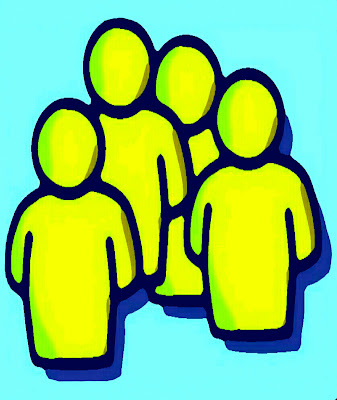 As the end of July 2021 approaches, we all still find ourselves engaged in complicated situations that no one anticipated when this decade began a year and a half ago. The COVID-19 Pandemic is still a concern, with the work of vaccinations continuing and questions arising regarding the dangers posed by new variants of the virus. At the present moment, ordinary daily interactions among people (in my country, at least) have opened up, and we all hope that the frightening experience of "lockdown" is behind us. The worst months of last year were a reminder to us of how difficult it is to live under isolating conditions (even as many people developed creative ways of sustaining some level of "interpersonal connection" via livestream media). Perhaps we have learned not to take one another so much for granted. While it remains to be seen how much we will remember from the hard lessons of these times, the fact remains that relationships and community are fundamental to being human — to living fully as a persons. Indeed, community and its organic expressions are fundamental to the vitality of society.We need community. We need persons and families connected to one another by the common experience of life, the common struggle for life's needs and celebration of its joys. In community, human persons journey together toward their destiny, helping one another. Without community, we cannot hope to find adequate solutions to any of the practical social troubles we face.
As the end of July 2021 approaches, we all still find ourselves engaged in complicated situations that no one anticipated when this decade began a year and a half ago. The COVID-19 Pandemic is still a concern, with the work of vaccinations continuing and questions arising regarding the dangers posed by new variants of the virus. At the present moment, ordinary daily interactions among people (in my country, at least) have opened up, and we all hope that the frightening experience of "lockdown" is behind us. The worst months of last year were a reminder to us of how difficult it is to live under isolating conditions (even as many people developed creative ways of sustaining some level of "interpersonal connection" via livestream media). Perhaps we have learned not to take one another so much for granted. While it remains to be seen how much we will remember from the hard lessons of these times, the fact remains that relationships and community are fundamental to being human — to living fully as a persons. Indeed, community and its organic expressions are fundamental to the vitality of society.We need community. We need persons and families connected to one another by the common experience of life, the common struggle for life's needs and celebration of its joys. In community, human persons journey together toward their destiny, helping one another. Without community, we cannot hope to find adequate solutions to any of the practical social troubles we face.But how do we even begin to "build up" networks of trustworthy interpersonal relationships? Community, by its very nature, cannot be imposed by an ideological scheme. Rather, we build community from the ground up, person-to-person, and we can begin now concretely by living in solidarity with those who have been entrusted to us.
At the same time, we must remain open to growing by encountering new people with realism, generosity, and hospitality (being ready to reach out especially to those in need). We must never forget that the person we meet, in whatever circumstances, is a unique someone, called and blessed and loved by God with an awesome and immense love.
Therefore, we must try to help one another as best we can and with the resources we have. We must love one another in the recognition that we are all sinners, we are all broken — and then listen to one another, help one another to recognize reality, and especially be ready to "suffer-with" one another. Since we are all selfish and make mistakes, we must above all forgive one another and bear with one another just as God forgives us and approaches us with such tenderness and patience.
Relying on His mercy, we must take up each day with the desire to grow in a sense of communal living — to grow in love — out of a humble awareness of our fragility and our inadequate ways of expressing mutual friendship. Let us desire to draw closer to, and to understand with greater compassion, the persons He has given to us.





